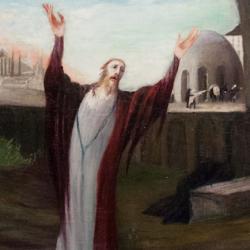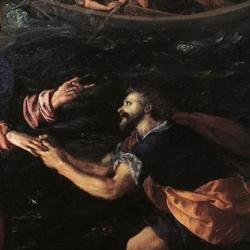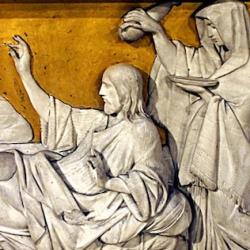INTRODUCTION
The Jewish leaders rejected John and Jesus, but this is nothing new. Jesus reminds them in parables that they have spent their entire history rejecting Yahweh’s servants and servants.
THE TEXT
“Hear another parable: There was a certain landowner who planted a vineyard and set a hedge around it, dug a winepress in it and built a tower. And he leased it to vinedressers and went into a far country. . . . ” (Matthew 21:33-22:22 ).
THE WICKED TENANTS
The parable of the tenants in the vineyard parable is a compressed record of Israel ’s history. Jesus borrows the image of the vineyard from Isaiah 5, also a warning about Israel ’s fruitlessness. In Jesus’ telling, Yahweh lent Israel a kingdom and a land, and expected Israel ’s leaders to produce fruit in it. But when Yahweh sent servants, the prophets, to collect the fruit, the tenants of the vineyard refused and abused the servants. When the son, Jesus, arrives, the tenants – the leaders of Israel – plan to kill Him. The result is that the kingdom/vineyard is taken from the leaders of Israel and given to another nation, the church ( 21:43 ). The Jewish leaders go away and ironically fulfill the parable by making plans to seize Jesus, but they still fear the crowd ( 21:46 ; cf. v. 26). It is another parabolic trap, as Jesus, like Nathan before David, leads them to judge themselves ( 21:41 ).
WEDDING FEAST
The next parable again tells the story of Israel , this time using the image of a wedding feast. The king sends servants, but like the tenants in the vineyard parable, the servants are ignored, greeted with lame excuses, and then abused (22:3-6). Jesus warns that the king will destroy the city of the original invitees (v. 7), as the Lord will eventually destroy Jerusalem . But the emphasis of the parable is at the end. Eager to have guests at his son’s wedding, the king invites people from the streets, the “tax collectors and harlots” who enter the kingdom before the religious experts (cf. 21:31 -32). But the parable ends strangely, with the expulsion of a guest who comes without proper clothing (vv. 11-13). Clothing symbolizes many things in the New Testament (Romans 13:12 -14; Galatians 3:27 ; Ephesians 4:22 -24; Colossians 3:9-11), but the most fitting is the use of clothing as a symbol of active righteousness (cf. Revelation 19:8). When the king inspects the guests, some will be found that are not wearing a righteousness greater than the righteousness of the scribes, and they will be cast into outer darkness.
CAESAR’S IMAGE
The chief priests and scribes tried to trap Jesus and found themselves trapped ( 21:23 -32). Now the Pharisees and Sadducees try but fare no better ( 22:15 -40). The Pharisees first attempt is to trap Jesus politically: Either Jesus will endorse tax revolt, which will get Him into trouble with the Romans, or He will endorse compliance with Rome , which will get Him into trouble with some of the Jews ( 22:16 -17). Jesus’ words also leave the hearers mystified about Jesus politics. “Render to Caesar” could mean “give Caesar what he deserves” or it could mean “pay your taxes.” Jesus avoids the trap, but at the same time, by implying that men owe themselves to God because they bear His image, He calls them to righteousness.











